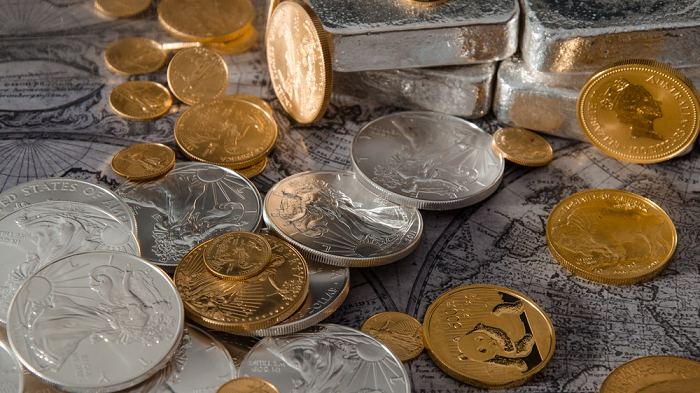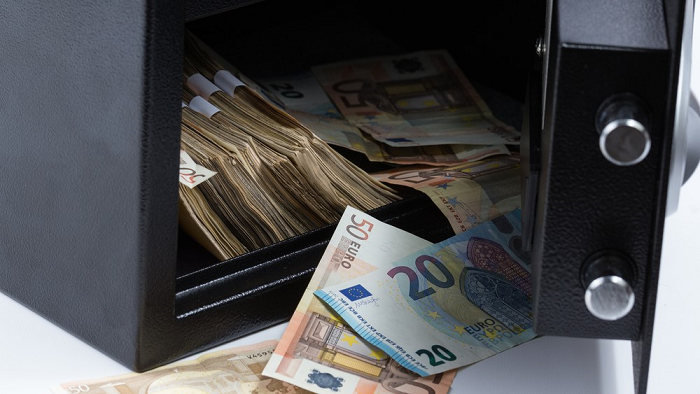Phase 5 — Living the Gentleman Spy Lifestyle
Lesson 3 — Money
LESSON 3: Money

"If you pull out these straps, inside are 50 gold sovereigns - 25 in either side" ~Q to 007 in From Russia With Love
At the root of everything else in this section is a simple piece of advice:
Money. Solves. Problems.
Whether you're paying for a nice dinner, putting fuel in your car, or you were caught smuggling diamonds, drugs, or guns out of a third world country, if you have enough money, you can solve almost any problem.
Of course you should have money in the bank, credit cards, and insurance. Money in the bank or having good insurance may pay for a needed surgery or buy a car, and a credit card with a high limit may pay for a next day flight home if something goes wrong in a foreign country.
But your Master Card won't do you any good if there's a power outage, you don't tip the maître d' with a Visa, and you can't bribe a police officer in Mexico or Thailand with American Express.
Problems that have a monetary solution aren't solved with plastic or electronics.
They're solved with cash or gold.
Carry Cash

In the world of electronic payments, credit cards, and paying with a thumbprint on your phone, fewer men carry cash than ever before. Among those that do carry cash, almost none of them carry enough.
Whether it’s to split a bill, leave a tip, because of an emergency like a power outage, or an inconvenience like a suspended or stolen credit card, you need to make sure you have enough cash on you to deal with unforeseen consequences.
How much is enough will depend on your situation, but you should be prepared to take care of at least a nice evening out, and ideally more.
A good starting point is to carry at least $100. If you simply can’t afford to carry more this is enough to cover basic expenses like splitting a dinner bill, putting fuel in your car, or buying a few rounds of drinks at the bar.
$500 is better if you can afford it. This is a solid insurance policy that can get you out of trouble where just having a credit card might not. Especially if you travel around second or third world countries where bribery is the norm, having at least a few hundred dollars (or Euros), can keep you out of trouble.
Keep $50–100 in usable bills ($1's–$20's) in a money clip in your front pocket. This is your everyday spending money. Regular payments, tips, etc. come from here. The remainder can be in $50's or $100's in your wallet. This is backup money; you're not planning on using it, but it's there to solve problems if you need it.
For the global man of adventure, aim to have substantially more. $1,000 USD and/or €1,000 and/or a similar value of the local currency in other areas that you visit frequently.
This is especially important for the frequent traveler and those who regularly visit areas where political, civil, or environmental unrest could easily turn a beautiful vacation into a life or death situation. When you travel, you should have enough cash to purchase a same-day, one-way ticket home, no matter what.
Ideally, you would keep $100–$300 or so in smaller bills in a money clip in your front pants or jacket pocket. This is your daily use money and the only cash that most people should ever know you have. Keep another $100–$1,000+ in larger bills tucked away in your wallet. This is emergency money that only comes into play if you absolutely need it.
If you are going to carry more than that, you should be separating it into various pockets, luggage compartments, even under the insoles of your shoes so that if something bad happens you don’t lose all your assets at once.
If you're going to carry around more than $1,000/ €1,000, you could — and probably should — start looking into alternative stores of value.
Precious Metals

In From Russia With Love, 007 is issued an attache case that contains 50 gold sovereigns in a hidden compartment. This practice is still common in today’s military and intelligence circles when operatives are in foreign environments.
Precious metals, specifically gold and silver coins, are easy to purchase, easy to sell, and provide a portable, concealable, liquid store of value.
For the global traveler, those living in volatile environments, or the family man who wants to be prepared for anything that comes your way, having precious metals as an insurance policy can be a very good idea.
This recommendation is not about "investing" in gold and silver. This is about having a durable, portable, concealable, store of value. You're not getting into gold and silver in order to make money, you're holding them as a hedge against losing everything.
No matter your government's fiscal policy, gold and silver have proved to be functional and valuable money for thousands of years. Currencies come and go, but an ounce of gold was valuable two thousand years ago, two hundred years ago, and will almost certainly continue to be two hundred years from now.
Regardless of what happens to the bolívar, dinar, dollar, euro, lira, peso, pound, renminbi, rial, or yen, gold and silver will remain valuable.
How much you choose to have in gold and silver is up to you, but it could easily be 5–20% of your total net worth in various forms of bullion.
For those wondering, with current gold prices, James Bond’s 50 gold sovereigns would be worth $15,000/£10,000. That is enough to get you out of — or into, if that's your thing — some pretty serious trouble.
Cash Reserve

The most likely "disaster" for the vast majority of people is a financial disaster, yet it is also one that many people are entirely capable of mitigating. Provided they plan for it.
A medical condition often means financial ruin — medical expenses represent more than 60% of bankruptcies in the United States.
Work disruption — due to job loss, job changes, or injury — is the next most common cause of financial struggle; interestingly also leading to the next...
Divorce creates financial strain all around, whether it's a basic divorce with no children, or a high–conflict divorce involving multiple children and complex asset distribution.
Unexpected expenses — broken down vehicles, natural disasters, or unexpected legal troubles — can land you hundreds or thousands of dollars in debt overnight.
The vast majority of Americans and many elsewhere in the world live at the very edge of their means, and often slightly beyond. Income is leveraged to pay for lifestyles, goods, and services that they don't need, and often don't even really want.
With all of that bad news, it's not all doom and gloom, and taking steps to secure your future is often quite simple.
Start saving. Cash. Now.
Your goal is to have at least three months salary, in cash, at home. When you have three months saved up, evaluate your progress. If possible, keep working towards six months or a year.
For some, this may seem like an insurmountable task, but it can be done, probably more easily than you expect.
You may be able to simply move some funds around, withdraw some money from the bank, and take care of this step overnight. If that's the case, good for you — go for it.
More than likely, this will take anywhere from a few months to a few years to accomplish. That is normal and okay. Just make sure you actually do it:
- Set up a sub-savings account to make sure you actually have somewhere to put the money you're about to save
- Negotiate lower rates with service providers (credit card, phone, internet provider, etc.)
- Cancel services you're paying for but no longer use (memberships, subscriptions, etc.)
- Stop doing things that cost you money but don't add value to your life (make your own coffee instead of stopping at Starbucks every morning, bring your lunch to work instead of going out for lunch every day, eat at home more often, drink with friends at home instead of going out to the bar, etc.)
- Pay off the highest interest rate debts first (could easily save yourself $300–500/month doing this
Assuming you are living within your means, you could probably save yourself $500–1,000+ per month. KEEP TRACK OF THOSE SAVINGS AND ROLL THEM INTO A SAVINGS ACCOUNT until you have an appropriate emergency fund saved up. Then decide if you want/need to keep that in the bank, in cash at home, or somewhere in the middle.
If you make $4,000/month and can save $500 of it, you'll have your emergency stash built up in two years. If you make $6,000/month and can save $1,000 per month, which is not nearly as hard as you think, you can have your emergency fund stocked in a year and a half.
While this sounds like a lot of money, or time, or giving things up, the reality is different. Financial stress is one of the biggest worries for most people. Having an appropriate emergency reserve insulates you from myriad problems that occur and builds a cushion that positively affects every aspect of your life.
If this sounds too hard, check out the next section. Automating your finances makes all of this easier.
Automate Your Finances

The easiest way to make everything surrounding your financial situation easier is to automate it. All of it.
From receiving your paycheck via direct deposit to paying your rent or mortgage with automatic payments or transfers, using auto-pay for bills like your phone, utilities, or memberships, there is very little need for you to spend much time or mental bandwidth worrying about finances.
If you are currently writing checks, making phone calls, or logging into accounts to make payments every month, you can do better.
Automate your retirement: contribute to your employer's 401(k) up to their matching limit, then max out your Roth IRA ($5,500/year), then max out the rest of your 401(k).
Automate your savings: set up a rule so that when your salary is direct-deposited into your account, a portion of that (5–10%) gets pushed into your savings account automatically. Every month. Without you ever having to think about it again. If you're using the steps above to save for an emergency fund, ADD those savings to the 5–10% of your income and set up a rule so that those funds are automatically moved into the "Emergency Fund" sub-account.
Automate your payments: enroll in auto-pay wherever possible. This can be done via your credit card, ACH transfers, or even having your bank write and send physical checks every month (this can be arranged at many financial institutions).
Pay off debt: start with the highest interest rates, pay it off completely, then move to the next highest interest rate. Continue with this process until you have no debt except a fixed-rate mortgage. Pay off your credit cards (that you're using to automate your payments) in full each month. Interest rates don't matter if you're not paying interest, so pay it all off and you're good to go.
This is basically a "set it and forget it" strategy. Set up all of the key segments once, then spend a month or two checking in on all the required due dates to make sure that everything is running properly. After that, you can spend five minutes once a month to check in a few days after pay-day to make sure that all the transfers and payments ran properly.
Automating your finances is one of the single best things you can do both get all your financial needs in order and reduce stress.
Get it set up, then sit back and build wealth while you're busy with everything else you'd rather be doing.
Next Steps

The steps above may sound like a lot to many men. And they can be, especially if you’re not on sound financial footing. But it doesn’t take as much as you think to get back on track.
Don't worry about keeping $1,000 in your pocket until you're comfortably building your savings.
Don't even think about diversifying into gold and silver until you've paid down your debt and are investing in your retirement accounts.
Don't worry about crazy scenarios like hedging for financial collapse or worrying about bribing third world cops before you've hedged your bets at home by having three months of salary saved and ready for far more likely events at home.
If you don't think you can do all of that in a reasonable time frame, stop reading this right now and get a copy of Ramit Sethi’s I Will Teach You to be Rich. Go through the paces to automate your finances, pay down your debt, and build your savings. You’ll be amazed at how easy it is to get your financial house in order and start living like 007.
PROGRAM
In the next lesson...
If you know more about sports, movies, or reality TV than you do news, world events, or politics, the next section is for you. Living like a Gentleman Spy means staying informed about the things that matter.
